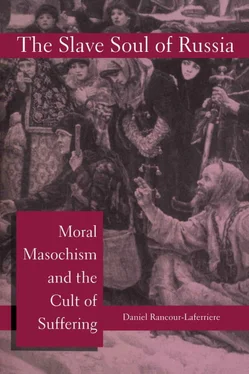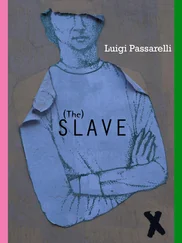Masochism, like the heroic resistance Topolianskii speaks of, is an individual matter. Masochism is not a phenomenon of the faceless masses—although the self-destructive behavior of groups is itself an observable phenomenon in Russia, and a legitimate object of sociological study. Russians may sometimes seem to resemble a herd of lemmings headed into the sea, but that does not make the individual lemming any less interesting.
Psychoanalysis is, quite literally, analysis of the individual psyche. The collective is something else again. Many Russians feel that the collective is the most important thing in the world, but in psychoanalysis the individual reigns supreme. This is certainly one reason why there was a long history of hostility to psychoanalysis in Soviet Russia.
In any case, psychoanalysis understands that the individual who knuckles under to the collective is betraying himself or herself. The psychoanalyst cannot but observe that such submission, however understandable in context, is a form of masochism.
Masochism and the Slave Image
It is important to define the central concept of this book from the very start. Masochism, in the broadest sense (as opposed to the original, narrowly erotic sense), 13is defined by psychoanalyst Anita Weinreb Katz as follows: “any behavioral act, verbalization, or fantasy that—by unconscious design—is physically or psychically injurious to oneself, self-defeating, humiliating, or unduly self-sacrificing.” 14This is roughly what Freud meant by his term “moral masochism.” 15Note that enjoyment is not part of this particular psychoanalytic concept, although the masochist, like anyone else, does strive for pleasure, and sometimes even achieves it. It should also be pointed out that, according to this definition, masochism can exist not only at a literal, behavioral level, but at other levels as well (one may wish to be beaten in reality, but one may also wish to be beaten only in fantasy—which means that masochism can occur in dreams, folklore, literary works, political commentary, religious teachings, etc.). The definition of masochism is not normally extended so far, however, as to include aggression directed outward, away from the self, for then we would be dealing with what psychoanalysts term sadism, or with the fuzzier and more problematical notion of the death instinct. 16The definition of masochism utilized here also does not require a sadistic partner to participate in the masochistic act. Although sadomasochistic relationships are common, it is perfectly feasible to engage in masochistic behavior or fantasy without the participation of a sadist (e.g., one can beat oneself). Similarly, it is quite feasible to be a sadist without the participation of a masochist (e.g., one can beat others against their will).
Note also that no claim is being made here about whether masochism is “pathological,” or “abnormal,” or a “disorder.” Western clinicians may use these terms, which are appropriate in their own cultural context. But I will try to avoid such evaluative epithets to characterize behavior in the Russian cultural context, even though the behavior in question may be fully comparable to what occurs in the Western clinic (and, by the way, in many areas of everyday life in the West as well).
I argue that the traditional submissiveness and self-destructiveness of the Russian slave mentality constitute a form of masochism. To say that the Russian soul is a slave is to say that Russians tend to injure themselves, defeat themselves, humiliate themselves, or sacrifice themselves unduly—all behaviors that characterize masochism in the Western clinical sense of the term.
And again, it is individual Russians who do these things. One may say that there is a culture of moral masochism in Russia, but it is individuals who enact that culture, who endow it with its masochism. Russia offers opportunities galore for suffering, as we will see, but it is individuals (even if fictitious individuals, such as Stavrogin or Ivan the fool) who take up the culture on its offer to suffer.
I am not going to argue that masochism is the essence of the so-called “Russian national character.” If there is even such a thing as “national character” (or “modal personality,” as some psychological anthropologists prefer to say), it has many aspects. The slave mentality is only one aspect. For personal reasons I became interested specifically in the masochistic feature of Russians. My task is not so much to “characterize” Russians as to examine a particular characteristic , masochism, as it occurs in individual Russians and in some established Russian sociocultural practices.
I want to emphasize that it is Russians who are being studied here, not any other Slavs such as Poles, Ukrainians, Slovaks, Czechs, Croats, Serbs, or Bulgarians. The terms “pan-Slavism” and “Slavophilism” (which all too often have meant pan-Russism and Russophilism) 17have led to certain misunderstandings among non-Slavists. Some scholars—including psychoanalytic scholars—have tended to play fast and loose with the very term “Slavic,” treating the highly diverse Slavic nationalities as if they were all homogeneous. But they are not. A Russian is not the same as, say, a Slovak—linguistically, politically, geographically— and psychologically. Some psychoanalytic scholars have even confused the non -Slavic ethnic groups of the Soviet Union with Russians (as when the acts of the Georgian Iosif Stalin are said to exemplify “Russian” behavior). The psychoanalytic scholar of Russian culture is just as obliged to learn the Russian language and survey the field of Russian studies as the Slavist is obliged to make an in-depth study of psychoanalysis before applying psychoanalysis to a Slavic topic.
Another sociocultural category that is not being studied here is the so-called Homo sovieticus who, as Mikhail Heller (Geller) and others have argued, possesses a relatively coherent set of (psychological and other) traits. 18It is true that great changes occurred in Russia when the Soviets came to power, and that these changes could not but be reflected in the psyches of individual Russians residing there. Fear became a particularly important psychological factor, especially during the Stalin period. But my project is tightly focused on Russian masochism, which existed continuously before, during, and after the Soviet Union’s seventy or so years of existence. Homo sovieticus may be a legitimate object of psychological study, just as “national character” may be. In particular, it would be interesting to find out which elements of Homo sovieticus are new and which merely derive from the old Homo russicus (or the old Homo ucrainicus or Homo belarussicus , etc., for that matter). But these questions would take us far afield.
I am not the first to apply the clinical term “masochism” to Russians. The most relevant work in this area was done by British psychiatrist Henry V. Dicks, a fluent speaker of Russian who interviewed Soviet soldiers who ended up in the West after World War II. Dicks refers to the “moral masochism,” “intra-punitive tendencies,” and “self-directed aggression” in his subjects. 19He provides specific examples:
Frequently described reactions to threats by superiors, e.g., in the Army, are varying degrees of “self-immolation.” A man berated by someone against whom he is powerless will suddenly, as it were, throw up his hands and say, “All right—shoot me then if you like—what do I care?” 20
Russians have long experience of “absorbing” without rejoinder the insults and indignities of their masters and social superiors. The impassive exterior conceals a reaction which can be verbalized as follows: “You think me a fool and a knave. You think I am a feelingless clot and dumb beast. All right then, that’s how I will act!” From this there result, according to my informants, countless acts of calculated clumsiness, spoiling of output or machinery, delays and muddles which are so contrived that while the perpetrators (often acting in silent collusion) are shown up as stupid and may be punished, they chiefly result in the vexation or heavy punishment of their superiors. 21
Читать дальше












